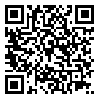1- Dept. of Pediatric Nursing, School of Nursing, Arak University of Medical Sciences, Arak, Iran; Students Research Committee, Arak University of Medical Sciences, Arak, Iran
2- Dept. of Pediatric Nursing, School of Nursing, Arak University of Medical Sciences, Arak, Iran ,sajadimahbobeh@yahoo.com
3- Dept. of Pediatric Nursing, School of Nursing, Arak University of Medical Sciences, Arak, Iran
4- Dept. of Epidemiology and Biostatistics, School of Health, Tehran University of Medical Sciences, Tehran, Iran
2- Dept. of Pediatric Nursing, School of Nursing, Arak University of Medical Sciences, Arak, Iran ,
3- Dept. of Pediatric Nursing, School of Nursing, Arak University of Medical Sciences, Arak, Iran
4- Dept. of Epidemiology and Biostatistics, School of Health, Tehran University of Medical Sciences, Tehran, Iran
Abstract: (361 Views)
Background & Aim: Children are a particularly vulnerable group, and mothers' knowledge and awareness play a crucial role in fostering their developmental progress. Insufficient knowledge of the cognitive, emotional, and social aspects of child development may lead to a decrease in parental self-efficacy. This study aims to investigate the effect of a family-centered empowerment model on mothers' self-efficacy regarding the growth and development of toddlers.
Methods & Materials: This quasi-experimental study was conducted in 2022 at Amir Kabir Hospital in Arak. A total of 72 mothers of hospitalized toddlers were selected and randomly assigned to either a control group (n=36) or an intervention group (n=36) through block randomization. The control group received standard hospital care, while the intervention group participated in a five-session, family-centered empowerment model program, with each session lasting 60 minutes. Data were collected using demographic questionnaires and parenting self-efficacy assessments, administered before the intervention, immediately after, and one month post-intervention. Analysis was performed using SPSS version 26, incorporating both descriptive and inferential statistics.
Results: The results showed that the mean self-efficacy scores before the intervention had no statistically significant difference between the two groups (P=0.416). However, post-intervention, the mean parenting self-efficacy scores demonstrated a statistically significant difference between the groups (P<0.001). Additionally, the mean parenting self-efficacy scores measured one month after the intervention also showed a statistically significant difference (P<0.001).
Conclusion: The family-centered empowerment model significantly improved mothers' self-efficacy. It is recommended as an effective approach for improving the management of children's growth and development.
Methods & Materials: This quasi-experimental study was conducted in 2022 at Amir Kabir Hospital in Arak. A total of 72 mothers of hospitalized toddlers were selected and randomly assigned to either a control group (n=36) or an intervention group (n=36) through block randomization. The control group received standard hospital care, while the intervention group participated in a five-session, family-centered empowerment model program, with each session lasting 60 minutes. Data were collected using demographic questionnaires and parenting self-efficacy assessments, administered before the intervention, immediately after, and one month post-intervention. Analysis was performed using SPSS version 26, incorporating both descriptive and inferential statistics.
Results: The results showed that the mean self-efficacy scores before the intervention had no statistically significant difference between the two groups (P=0.416). However, post-intervention, the mean parenting self-efficacy scores demonstrated a statistically significant difference between the groups (P<0.001). Additionally, the mean parenting self-efficacy scores measured one month after the intervention also showed a statistically significant difference (P<0.001).
Conclusion: The family-centered empowerment model significantly improved mothers' self-efficacy. It is recommended as an effective approach for improving the management of children's growth and development.
Type of Study: Research |
Subject:
Nursing Care
Send email to the article author
| Rights and permissions | |
 |
This work is licensed under a Creative Commons Attribution-NonCommercial 4.0 International License. |






